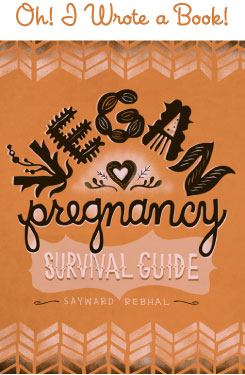
By now we all know that whole, unprocessed foods should form the foundation of our diet. But even us ever-so-savvy epicureans sometimes find ourselves purchasing packaged goods. We don’t always have the foresight to bake our own bread, or the time to make our own soup stock. I’ll admit it, I occasionally consume canned beans, or even *gasp horror* store-bought soup. And I just adore this local sandwich bread. So okay, there’s a time and a place for pre-made items. But do you always know what you’re getting?
Most veg*ns are already expert label-readers, but we’re often tuned in to the additives we should avoid (like casein, whey, L-cysteine, carmine, etc). But what about the other side – those chemicals with names so nefarious-sounding . . . that are actually quite harmless! What follows is a list of ingredients that you DON’T need to avoid:
Agar – an algae extract, used as a thickener, a veg*n alternative to gelatin
Alpha-carotene – plant based vitamin A
Alpha-tocopherol – a form of vitamin E
Annatto – a plant derived all natural coloring (some people may be sensitive)
Ascorbate – a form of vitamin C
Ascorbic Acid – vitamin C is one form
Beta-carotene – the plant derived precursor to vitamin A
Beta-cryptoxanthin – a carotenoid, another precursor to vitamin A
Biotin – part of the B-complex, this is vitamin B7
Carageenan – seaweed extract, a veg*n alternative to gelatin
Cholecalciferol – vitamin D3 (not vegan)
Choline Bitartrate – an essential nutrient, part of the B-complex
Citric Acid – natural flavoring and preservative
Cyanocobalamin – part of the B-complex, this is a form of vitamin B12
Ergocalciferol – vitamin D2, the vegan form
Folacin – part of the B-complex, this is one name for vitamin B9
Folate – part of the B-complex, naturally occurring vitamin B9
Folic Acid – part of the B-complex, another form of vitamin B9
Lecithin – a naturally derived additive, though there is some debate as to its safety because it is processed (may or may not be vegan)
Methylcobalamin – part of the B-complex, this is another form of vitamin B12
Niacin – part of the B-complex, this is vitamin B3
Niacinamide – part of the B-complex, the converted form of vitamin B3
Nicotinic Acid – part of the B-complex, another name for vitamin B3
Pantothenic Acid – part of the B-complex, this is vitamin B5
Phylloquinone – vitamin K1, from plant sources
Potassium Iodide – supplemental iodine
Pteroylglutamic Acid – part of the B-complex, the chemical name for B9
Pyridoxal – part of the B-complex, a natural form of vitamin B6
Pyridoxamine – part of the B-complex, a natural form of vitamin B6
Pyridoxine – part of the B-complex, a natural form of vitamin B6
Pyridoxine Hydrochloride – part of the B-complex, another form of vitamin B6
Retinol/Retinyl Palmitate – synthetic pre-form of vitamin A
Retinyl acetate – a naturally occurring form of vitamin A
Riboflavin – part of the B-complex, this is vitamin B2
Sodium Ascorbate – a form of vitamin C
Sodium Bicarbonate – baking soda!
Thiamine – part of the B-complex, this is vitamin B1
Thiamine Mononitrate – part of the B-complex, this is also vitamin B1
Tocopherol – the general group name that includes vitamin E
Tocopherol Acetate – a form of vitamin E
Tocotrienol – a form of vitamin E
Turmeric – a plant derived natural colorant and spice
Zinc Citrate – supplemental zinc
Zinc Oxide – inorganic zinc
Why not print out this little list and slip it into your purse? It’ll come in handy to calm your nerves as you’re scanning packages on your next grocery excursion. And remember – the fewer ingredients the better! For more on interpreting a nutrition label, check out my three part series here: 1 2 3
-
Christa
-
http://contagioushealth.blogspot.com Melissa
-
Nahui
-
http://twitter.com/erosan erosan
-
Annie
-
Barbara
-
Rebecca
-
http://victoriaoconnell.blogspot.com Vicki-Lou
-
Alyssa
-
Chance
-
Alyssa
-
NotSoCarageenan




